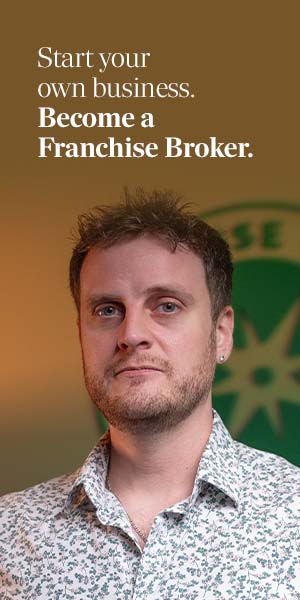Is franchise brokerage only for people with business degrees? Do you need prior franchise ownership to advise others? Is it too expensive to get started as a franchise consultant? If you’re exploring how to become a franchise broker, you’ve likely come across a mix of opportunity and misinformation. Like many careers in franchising, franchise brokerage is often misunderstood.
Myths about licensing, qualifications, earning potential, and startup costs prevent many qualified individuals from pursuing this flexible and rewarding career path. In reality, becoming a franchise broker is accessible to professionals from all backgrounds.
In this article, we break down the biggest myths about franchise consulting and reveal the real truths every aspiring franchise broker should know. Whether you’re starting a new career or entering entrepreneurship for the first time, understanding these facts can help you move forward with confidence.
Myth #1: You Need a Business Degree to Be a Franchise Broker.
The truth is that practical skills matter far more than formal education. While a business degree can offer some foundation, it’s not required for success in franchise brokerage. Many top-performing franchise brokers come from diverse fields such as sales, healthcare, education, engineering, and law enforcement. What truly drives success in franchise consulting is the ability to communicate effectively, actively listen, build client relationships, manage time, conduct research, and ethically guide clients through important decisions.
Key skills that make franchise brokers successful include:
- Active listening and consultative communication
- Organization and time management
- Client relationship building
- Industry research and ethical advising
Franchise broker training programs, like those offered by the Franchise Training Institute (FTI), provide hands-on education, real-world case studies, and mentorship, making it possible for individuals from all backgrounds to launch successful franchise consulting careers.
Myth #2: You Have to Be a Former Franchise Owner First.
The truth is that prior franchise ownership can be helpful—but it’s absolutely not required to become a successful franchise broker. Many professionals transition into franchise consulting from fields like finance, marketing, human resources, engineering, and healthcare. Their diverse experience often gives them unique advantages when advising clients on franchise opportunities. For example:
- Marketing professionals help franchise brands position themselves effectively
- Financial advisors easily explain investment structures and funding options
- Engineers apply systematic thinking to client evaluations
- Medical professionals guide clients toward health-focused franchise concepts
What unites successful franchise brokers isn’t their previous careers—it’s their ability to learn continuously, adapt to industry changes, and serve clients with honesty, integrity, and clear guidance.
Myth #3: You Have to Be a Former Franchise Owner First.
The truth is that prior franchise ownership can be helpful—but it’s absolutely not required to become a successful franchise broker. Many professionals transition into franchise consulting from fields like finance, marketing, human resources, engineering, and healthcare. Their diverse experience often gives them unique advantages when advising clients on franchise opportunities. For example:
Marketing professionals help franchise brands position themselves effectively
- Financial advisors easily explain investment structures and funding options
- Engineers apply systematic thinking to client evaluations
- Medical professionals guide clients toward health-focused franchise concepts
What unites successful franchise brokers isn’t their previous careers—it’s their ability to learn continuously, adapt to industry changes, and serve clients with honesty, integrity, and clear guidance.
Myth #4: Franchise Brokers Just Push Deals to Earn Commissions.
The truth is that ethical franchise brokers put their clients first and focus on building long-term relationships, not just closing deals. While brokers are compensated by franchisors, the most successful franchise consultants take a client-centered approach, knowing that reputation, trust, and referrals drive sustainable business growth. A professional franchise broker’s responsibilities include:
- Understanding each client’s goals, background, and risk tolerance
- Researching and presenting the most suitable franchise opportunities
- Explaining legal, operational, and financial structures in detail
- Providing unbiased insights and answering tough client questions
Ethical franchise brokers always prioritize the right fit over commissions, recognizing that their clients’ long-term success strengthens both their own business and the franchise industry as a whole.
Myth #5: Becoming a Franchise Broker Is Too Expensive.
Truth: Startup Costs Are Low Compared to Most Businesses.
Another major misconception is that franchise brokerage requires a big upfront investment. Compared to opening a franchise location (which can cost hundreds of thousands of dollars), starting a franchise brokerage business is surprisingly affordable.
Typical startup costs include:
| Investment Category | Low Estimate* | High Estimate* |
| Training and Certification | $7,000* | $10,000* |
| CRM or Tech Tools | $500* | $1,500* |
| Website and Marketing Setup | $1,000* | $2,000* |
| Total Startup Range | $8,500* | $13,500* |
*Data based on research from industry sources. Fees, costs, and figures are estimates and may vary based on provider, location, and other factors.
There’s no need to lease space, buy inventory, or hire employees. Many brokers launch from home with just a laptop and a phone—and scale over time.
Myth #6: There’s No Real Training or Support Available.
The truth is that franchise brokers have access to world-class training and ongoing mentorship to help them succeed. This damaging myth often discourages potential brokers from pursuing the career, but in reality, organizations like the Franchise Training Institute (FTI) and the Franchise Brokers Association (FBA) provide extensive resources, including:
Comprehensive online franchise broker training programs
- Live coaching sessions and accountability calls
- Access to FranLink, a proprietary CRM and franchise lead-matching system
- Over 1,000 hours of archived video training content
- Ongoing collaboration and mentorship from experienced franchise brokers
These training resources give brokers the tools to continue learning, refine their consulting approach, and stay current with the ever-changing franchise industry.
Myth #7: It’s Just Another Sales Job.
The truth is that franchise brokerage is a consultative, educational role—not a high-pressure sales job. Successful franchise brokers don’t rely on cold calling or aggressive tactics. Instead, they guide clients through one of the most important financial and lifestyle decisions of their lives. This requires patience, empathy, strategic thinking, and a deep understanding of franchising. The best brokers serve as educators, advisors, and problem solvers, helping clients answer critical questions such as:
- Is this the right time for me to invest in a franchise?
- How do I evaluate and compare different franchise models?
- What are the risks, responsibilities, and expectations involved?
- Which industries best align with my skills, interests, and lifestyle goals?
By focusing on education and guidance, franchise brokers build trust, generate strong referrals, and create long-term satisfaction for both clients and franchisors.
How Much Does It Really Cost to Become a Franchise Broker?
One of the most attractive aspects of becoming a franchise broker is the relatively low cost of entry—especially when compared to opening a physical franchise location. While exact numbers may vary based on training provider and business setup choices, most aspiring brokers can expect to invest less than $15,000* to launch their practice.
Here’s a breakdown of typical startup costs:
| Investment Area | Low Estimate* | High Estimate* |
| Franchise Broker Training | $7,000* | $10,000* |
| CRM & Technology Tools | $500* | $1,500* |
| Website & Branding Materials | $500* | $1,000* |
| Initial Marketing & Outreach | $1,000* | $2,000* |
| Total Startup Estimate | $9,000* | $14,500* |
*Data based on research from industry sources and franchise broker training providers. Fees, costs, and figures are estimates and may vary based on provider, location, and individual business choices.
This lean startup model makes franchise brokerage an accessible and scalable business opportunity for many professionals—especially those looking to pivot careers or work independently without the overhead of a retail space or employees.
Is This Career Path the Right Fit for You?
Becoming a franchise broker doesn’t require a business degree, prior franchise ownership, or large startup capital—but it does require passion, drive, and a genuine desire to help others succeed.
If you’re curious, coachable, and committed to ethical client service, franchise brokerage can be an ideal path into entrepreneurship. With the right franchise broker training, expert mentorship, and a growth-focused mindset, you can build a rewarding, flexible, and future-proof career in franchise consulting.Ready to get started?
The Franchise Training Institute offers the resources and support you need to launch your career as a successful franchise broker. Learn more.



















